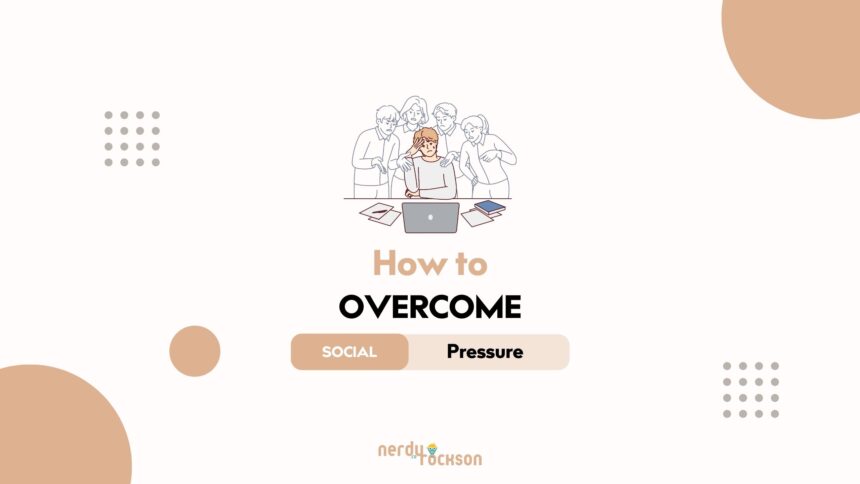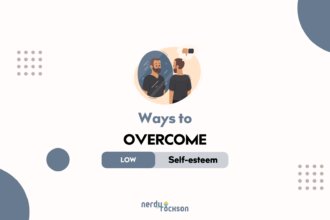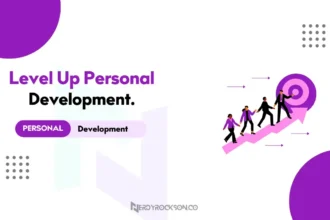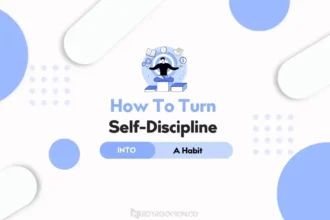Social pressure is a feeling that people experience when they are subjected to the norms and expectations of their social group or society at large. It can significantly influence our behaviour, decisions, and even our sense of self. Unfortunately, this pressure can lead to stress, anxiety, and a loss of individual identity. This is why it’s essential to understand how to overcome social pressure.
This article aims to provide practical strategies on how to overcome social pressure, allowing you to make choices independent of societal expectations. It empowers you by offering tactics to build self-confidence, develop assertiveness, seek support, and practice self-care. By taking these steps, you’ll be in a much better position to resist social pressure and live authentically.
Being yourself in an environment that is trying to make you something else is the greatest accomplishment.
Ralph Waldo Emerson
By understanding how to overcome social pressure, we can start to make decisions that truly reflect our feelings, beliefs, and desires. This freedom is not about disregarding the views of others entirely. Instead, it’s about permitting yourself to be your unique self regardless of societal expectations or norms.
The sections that follow will delve deeper into recognizing social pressure, understanding its impact, and most importantly, how to overcome social pressure. By the end, you’ll have a toolkit of practical strategies for confronting social pressure head-on and navigating life on your terms. Remember, overcoming social pressure is a skill that can be learned and mastered with time and practice.
Understanding Social Pressure
When it comes to understanding social pressure, it essentially takes on several forms, manifesting in our daily lives in sometimes subtle ways. Primarily, these can be divided into three broad categories: peer pressure, family pressure, and societal pressure. Each type has unique characteristics but they all have one thing in common — they can profoundly impact our behavior and choices.
Peer Pressure: This is perhaps one of the most recognizable forms of social pressure, often experienced during our school years but it can extend into adulthood. A simple example of peer pressure would be feeling compelled to wear certain types of clothes or adopt a particular behaviour to fit in with your group of friends, even if it’s against your preference.
Family Pressure: Family can often exert a subtle form of social pressure based on expectations of success, behaviour, or lifestyle. An instance could be parents anticipating their children to choose a specific career path such as law or medicine, even if the children have different passions or interests.
Societal Pressure: This form of pressure originates from social standards or norms established by society. For instance, the general expectation to finish education, get a high-paying job, settle down, and start a family by a certain age is a classic example of societal pressure.
By understanding these categories and their examples, it becomes clear that social pressure is deeply woven into our daily lives. The key to overcoming it is not to eliminate it completely, as it’s a part of human social structure, but rather to learn strategies and exercises to manage and navigate it skillfully, while staying true to oneself.
Recognizing Social Pressure
Unmasking the feeling of being under social pressure can be rather elusive, as it often camouflages itself as normalised societal expectations or standards; however, paying close heed to the scanty signals emitted by your body and mind can unveil its presence.
Are you often left with an eerie sense of discomfort just after an interaction? Do you find your heartbeat racing or palms sweating before group confrontations? Perhaps you’re frequently on edge, battling a gnawing anxiousness when put in unfamiliar social environments. These could be indicative signs of stress hormones launched by your body as a response to social pressure.
Feeling out of place or incompatible in certain contexts is another key symptom. It’s almost a universal experience to occasionally feel like a misfit; the distressing part emerges when this sentiment holds you hostage in your thoughts and persuades you to conform against your will, simply to fit in.
Listen to your gut feelings: they are your subconscious mind’s cry for attention. If you often leave social situations wishing you’d acted differently or find yourself constantly apprehensive of people’s judgement, you’re likely encountering social pressure. The crucial step here is to recognize these signs, without undermining them as mere overthinking or dismissing them as trivial.
The Impact of Social Pressure
Generally, social pressure has an insidious, yet significant, impact on various dimensions of our daily lives, notably mental and physical health, relationships, and personal growth. The consequences often creep in unnoticed, shaping our decisions, reactions, and perceptions gradually.
Impact on Physical and Mental Health:
Many studies suggest that social pressure can adversely affect our mental health, leading primarily to anxiety, depression, and distress. In fact, the American Psychological Association stated that young people identifying high levels of social pressure reported poor mental health. Another research study published in PLOS ONE showed that social pressure could lead to sleep deprivation and associated health issues. The constant need to conform, satisfy societal expectations, or gain approval can interfere with the quality of sleep, thereby affecting overall health.
Impact on Relationships:
Social pressure can also pose challenges to maintaining genuine and healthy relationships. According to a SAGE journal study, social pressure might push individuals to act against their wishes to please others, causing strain in relationships. In an attempt to live up to societal expectations, individuals may find themselves trapped in unsatisfactory relationships or sacrificing their authenticity.
Impact on Personal Growth:
Social pressure often impedes personal growth as well. Research findings published in Science Direct suggest that social pressure can undermine our capacity for self-determination, autonomy, and the development of personal interests. The external influence and fear of perceived judgement, can derail individuals from personal development milestones, and deter them from exploring their genuine passions and skills.
In a nutshell, social pressure acts as a significant barrier, deterring us from attaining a content and fulfilled life. It’s crucial to recognize these pressures in our lives and consciously learn to navigate them.
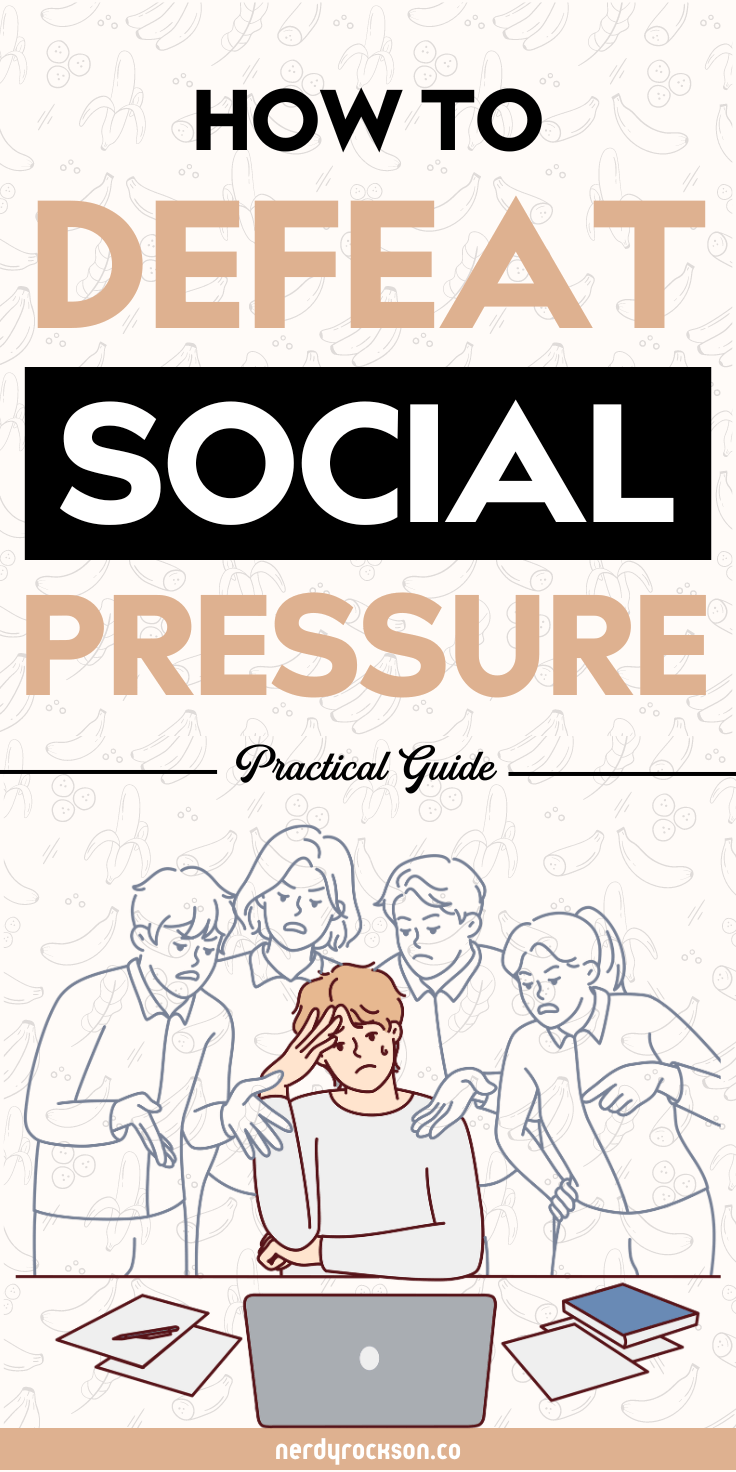
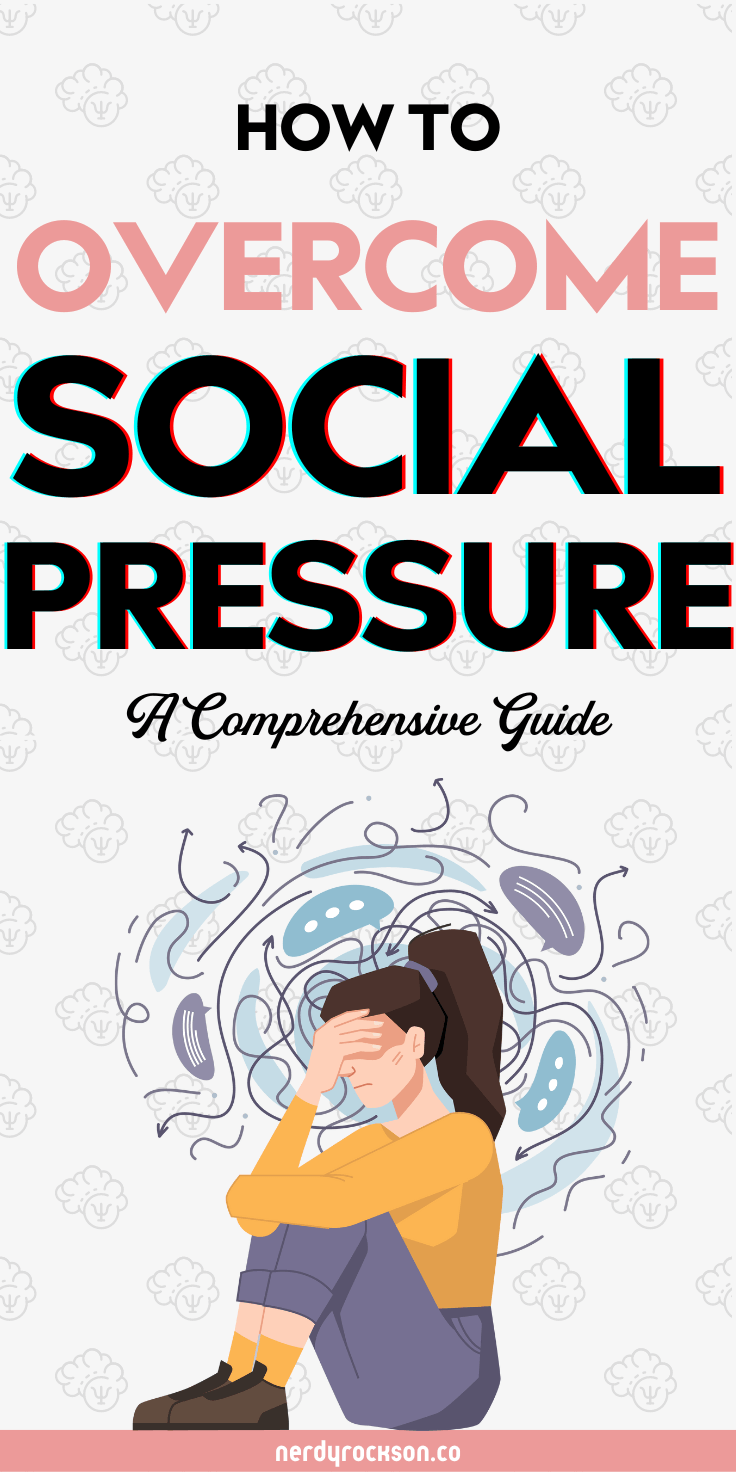
How to Overcome Social Pressure
Ready to conquer the world free from the shackles of social pressure? Great! But understanding and recognizing social pressure is only part of the journey. You also need practical ways to resist it and rise above it. This next segment offers actionable strategies that will equip you to handle and overcome social pressure effectively. It’s time to unleash your potential!
1. Building Self-Confidence
Embarking on a journey towards self-confidence is a potent way to push back against social pressures. A confident mind trusts its judgments, opinions, and abilities, ultimately becoming less susceptible to the whims and wishes of others. Let’s explore some strategies that can help you build this all-important trait.
Start with positive affirmations. These are simple empowerment-loaded phrases that, when repeated, can boost your self-esteem and reduce self-doubt. Phrases like ‘I am capable’, ‘I respect myself’, and ‘I believe in my abilities’ can create a positive picture in your mind, enabling you to face societal pressures effectively.
Setting and achieving personal goals is another strategy. Your goals are your North Star, guiding you along your path and keeping you focused on what truly matters. Achieving these goals, big or small, boosts your self-belief, making you resilient in the face of external opinions and demands. To start with, these goals can be simple — perhaps waking up earlier or reading several books monthly — but the real magic lies in achieving them and gradually levelling up.
Focused personal growth is a further method. Dedicate time and energy to develop your skills, knowledge, and talents. Superiority in these areas will naturally buoy your self-confidence, enabling you to assert yourself and erode social pressure. Whether it’s learning a new language, honing your artistic abilities or improving your physical fitness, the journey of growth can significantly help you stand your ground confidently against societal expectations.
Remember, building self-confidence doesn’t happen overnight — it’s a commitment. But once you start the journey, you’ll find yourself better equipped to resist the pressures of society and live authentically to your values.
2. Developing Assertiveness
Assertiveness plays an instrumental role in managing social pressures. It’s like having a suit of armour shielding you, enabling you to respond decisively and appropriately to various social situations. Why is this, you might ask? Well, being assertive affirms your personal boundaries and rights, thereby mitigating the influence of external pressures exerted by society.
Now, it is crucial to understand that assertiveness is not an inherent trait. Instead, it is a skill that needs development and refinement over time. So, how can you cultivate assertiveness? Here are three practical strategies for you to consider:
- Practising Assertive Communication: The way you communicate significantly governs the way you are perceived and treated by others. When you communicate assertively, you express your feelings, ideas and rights without violating those of others. This approach highlights your respect for both yourself and others. As you may have guessed, assertive communication isn’t an overnight trick; it requires consistent efforts. Begin by stating your feelings assertively in non-threatening scenarios and gradually work up to more challenging situations.
- Setting Boundaries: Establishing boundaries essentially means identifying your limits and sticking to them. These can span several areas, from your time, energy and comfort levels to more intellectual territories like beliefs and values. When you set concrete boundaries, it sends out a clear message: you respect yourself enough to protect your space and won’t be swayed by the crowd.
- Learning to Say No: Did you know that empowering yourself with the ability to say ‘no’ can have a considerable impact on the way you handle social pressure? Many times, you might find yourself agreeing to something just to please others or to avoid conflict. However, when you learn to say no without feeling guilty, you assert your right to determine your actions, thus significantly reducing the coercive power of social pressures.
While developing assertiveness takes effort and time, I assure you that the benefits make it worthwhile. Remember, your strength lies in how you manage to maintain your individuality amidst the sea of social pressures. So, won’t you equip yourself with the shield of assertiveness and stand tall against the waves of societal expectations?
3. Seeking Support
Wouldn’t you agree that it’s often easier to face a challenge when you don’t have to face it alone? It’s no different when it comes to social pressure. Navigating the complexities of societal expectations and pressure doesn’t need to be a solo endeavour. Seeking support serves as a key strategy in overcoming social pressure.
By engaging with trusted individuals, be they friends, family, or mentors, you’re inviting alternative perspectives into your understanding of the social pressures you face. They provide you a fresh viewpoint – a third person’s observation which can help you discern whether the pressure is genuine or perceived. A friend might have wrestled with the same dilemma and can impart their wisdom to you. These perspectives afford you a broader, perhaps less pressurised, view of your situation.
Finding validation for your feelings is another noteworthy aspect of seeking support. It’s eminently understandable to feel confused, upset, or stressed by social pressure. With support from those whom you trust, you can validate these emotions as part of a normal human experience, helping you to embrace rather than deny your feelings.
Last but not least, advice offered by others often presents practical steps or solutions that you might not have considered. Be it a professional counsellor skilled in strategies for managing social pressure or a seasoned relative sharing their life lessons, their advice can empower you to respond effectively to the social pressures you’re enduring.
In conclusion, seeking support helps you traverse your social pressure-laden path with perspective, validation, and advice, enabling you to face the pressure head-on with confidence and resilience. Remember, the burden isn’t yours alone to bear – seeking support is a healthy, proactive way to overcome social pressure.
4. Practising Mindfulness and Self-Care
Mindfulness and self-care are two powerful tools you can arm yourself with in your journey to overcoming social pressure. It’s been estimated that 80% of physician visits are related to stress, and what is a more constant source of stress than social pressure? The good news is, that it’s not an incurable condition or a sentence of a lifetime of discomfort.
Mindfulness is a practice of awareness, where you consciously take time to introspect and listen to your emotions, thoughts, and feelings. You achieve it by focusing on your breathing or the process of eating, for example. By doing so, you’re not only giving yourself a much-deserved break from continuous external stimuli but also learning to control your reactions to them. It’s like hitting the ‘pause’ button on your life, allowing you to step aside, analyse situations and reenter them with reduced intensity or influence.
Similarly, self-care activities nourish your mind and body, promoting better mental health and resilience to stressful situations. Regular exercise, a healthy diet, and enough sleep are not mere habits but integral aspects of a balanced lifestyle. They strengthen your body, and consequently, your mind, letting you face challenges, including social pressure, with greater fortitude.
Here are a few practical tips on incorporating mindfulness and self-care into your daily routine:
- Meditation: Set aside a few minutes every day, even just five to ten to start with, to sit quietly and focus on your breath. As thoughts arise, observe them without judgment, and let them go. This practice can help you develop a healthier relationship with your thoughts and emotions.
- Regular Exercise: You don’t have to run marathons. Find a physical activity you enjoy, be it walking, swimming, yoga, or dancing, and make it a part of your routine. Regular exercise can boost your mood and reduce feelings of anxiety and depression.
- Healthy Diet: Eat balanced, nutritious meals and avoid excessive caffeine or alcohol. A well-nourished body can better cope with stress and have a more positive impact on your mood.
- Self-Love: Treat yourself with kindness and compassion. Speak to yourself as you would to a dear friend. Let go of unnecessary guilt and embrace your uniqueness.
Always remember, you can’t pour from an empty cup. Paying attention to your self-care and practising mindfulness can shift the power balance from social pressure to you. It’s your life; let’s give you the steering wheel.
Conclusion
In conclusion, overcoming social pressure is not only beneficial but crucial for authentic living and optimal well-being. Through the discussed strategies, you hold the potential to reclaim your power and liberate yourself from the claustrophobic clutches of conformity. By building your self-confidence, developing a robust sense of assertiveness, seeking support when needed, and practising mindfulness and self-care, you can create a fortified shield against undue social pressures.
However, understanding the significance of these strategies is solely the beginning. The real magic happens when you implement them in your daily life, vigorously and consistently. Remember, each bold step you take towards resisting social pressure is a step towards an enriched and authentic existence, a broader understanding of your true self, and a richer, more fulfilling life. The key to this remarkable transformation is in your hands—the power to overcome social pressure.
So, will you take the plunge? Will you dare to embrace your individuality in a society that constantly pushes you towards conformity? It may be challenging initially, but the rewards—the authentic living, the peace of mind, the enhanced personal happiness, are truly worth the struggle. Be patient with yourself, steadfast in your resolve, and above all, committed to authenticity, and you are sure to overcome social pressure.
Resources for Further Help
Should you seek guidance beyond this article, there exists an array of invaluable resources out there, designed to help you navigate through the challenges brought upon by social pressure. Each one holds unique insights that can further equip you to overcome social pressure.
Books:
- ‘The Chimp Paradox‘, Dr Steve Peters: An enlightening read about understanding and managing our brains, which includes dealing with pressure and stress.
- ‘Quiet: The Power of Introverts in a World That Can’t Stop Talking‘, Susan Cain: A book offering insights into how introverts can thrive in a world dominated by extroverts, thereby resisting societal pressure.
Websites:
- Mindful.org: An online hub providing practical tips, techniques, and advice on mindfulness. Including ways to deal with stress and pressure.
- Psychology Today: A site that offers countless articles on various psychological topics, including social pressure.
Organisations:
- National Alliance on Mental Illness (NAMI): An organization offering education and advocacy for people dealing with mental health issues, including stress and anxiety caused by social pressure.
- Mental Health Foundation: This foundation provides research and resources on all aspects of mental health, including how to deal with social pressures in a healthy way.
Remember, reaching out for help is not a sign of weakness, rather, it exemplifies strength. Discover the available resources, you are not alone on this journey. Now that you know how to overcome social pressure, take a brave step forward towards a life you truly deserve!
FAQ
How can I handle social pressure at work?
There are several strategies for handling social pressure at work. Firstly, maintaining a sense of autonomy by making decisions based on personal values rather than external influences can greatly help. Engaging in regular mindfulness practices such as meditation and focused breathing techniques can also enable you to manage stress and stay emotionally balanced. Engage in assertive communication and speak up about your thoughts and feelings. Lastly, ensuring a strong social support network, either within or outside of the workplace, can act as a powerful buffer against social pressure. By practising these techniques, you are carving your path towards a healthier, more balanced work life.
What are some self-help methods to handle social pressure?
Yes, undoubtedly, self-help methods can be extremely potent for tackling social pressure. Begin by making time for introspection to identify the factors that put you under stress. Utilise journaling as a tool to reveal patterns and triggers. Find activities that bring joy and peace, helping in the release of endorphins, the feel-good hormones that improve mood and resilience. Positive affirmations and cognitive behaviour techniques can also be effective in altering negative thought patterns. Remember, it’s about consistently making conscious choices that validate your values and aspirations, not those dictated by others.
How can I use positive affirmations to combat social pressure?
Positive affirmations can be a powerful tool to combat social pressure. These are short, powerful statements that help to assert self-confidence and positive self-perception. To utilise them effectively against social pressure, you first need to identify an area where you feel the struggle, such as confidence in social gatherings. Come up with a positive counterpart, for example, “I am at ease in social situations and my opinions matter”. Repeat this affirmation daily, preferably in front of a mirror. Over time, you’ll start to internalise this positive belief, empowering yourself to resist and overcome social pressure.
How can I help a friend or family member overcome social pressure?
Serving as a safe haven for a friend or family member entangled in the web of social pressure can be an effective way to provide much-needed support. Begin by empathising with their struggles, and acknowledging their feelings rather than dismissing them. Equally significant is encouraging, and assisting them in re-affirming their values and principles. Extend your arm to help them explore professional help if they’re comfortable with it. This collective approach could indeed shed a ray of hope for those combating the shadows of social pressure.
